1. Suppose p,q,r,\[s\epsilon N\] and \[p\geq q\geq r\] . If \[5^{\log_{5}\left(2^{p}\right)}+7^{\log_{7}\left(2^{q}\right)}+11^{\log_{11}\left(2^{r}\right)}=2^{s}\]
a) q=p-1
b) r=p-1
c) s=p+1
d) All of the Above
Explanation: As for a > 0, a \[\neq\] 1,
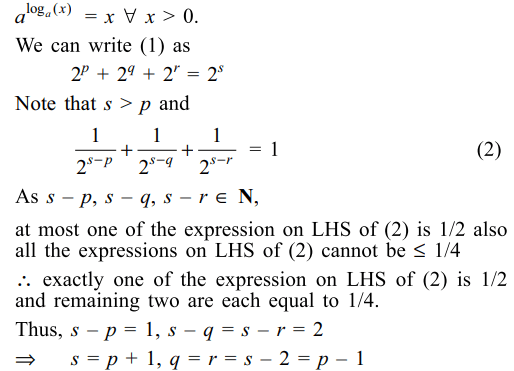
2. Suppose a,b,c,\[d\epsilon \left(1,\infty\right)\] and let
\[\alpha =\log_{abc}\left(10\right)+\log_{acd}\left(10\right)+\log_{abd}\left(10\right)+\log_{bcd }\left(10\right)\]
and \[\beta =\log_{a}\left(10\right)+\log_{b}\left(10\right)+\log_{c}\left(10\right)+\log_{d }\left(10\right)\]
a) \[\alpha\leq\beta\]
b) \[2\alpha\leq\beta\]
c) \[3\alpha\leq\beta\]
d) All of the Above
Explanation:

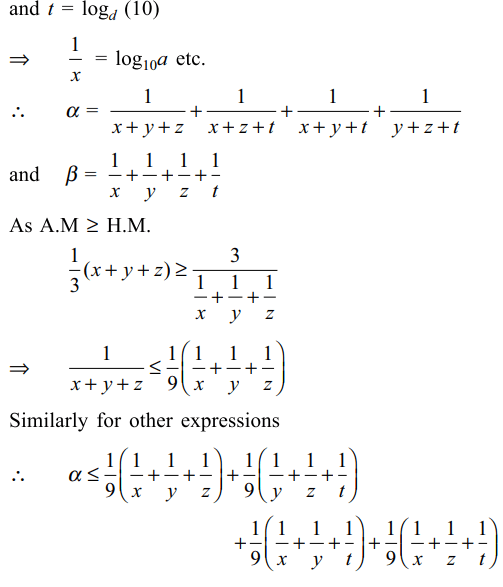
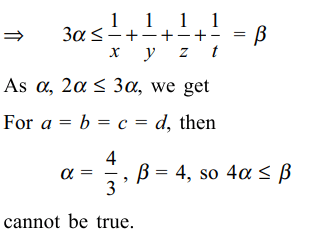
3. The set of all x satisfying \[4^{x^{2}+2}-\left(9\right)2^{x^{2}+2}+8=0\]
consists of
a) infinitely many points
b) exactly two integers
c) finitely many points from the set of all integers
d) Both b and c
Explanation:


4. The equations \[x^{\left[\left(\log_{5}x\right)^{2}-\frac{9}{2}\log_{5}x+5\right]}=5\sqrt{5}\]
has
a) exactly three real solution
b) at least one real solution
c) exactly one irrational solution
d) All of the Above
Explanation: Taking logarithm of both sides, we get
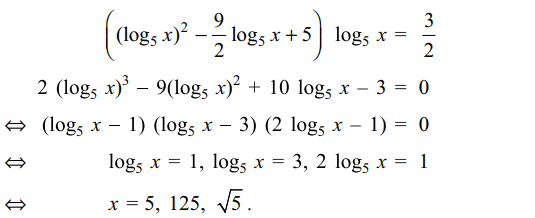
5. if \[\log_{2}\left(3^{2x-2}+7\right)=2+\log_{2}\left(3^{x-1}+1\right)\]
then x equals
a) 0
b) 1
c) 2
d) Both b and c
Explanation:
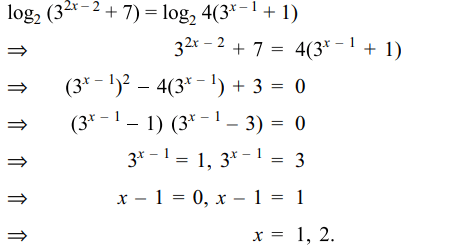
6. Solution of \[\log_{x^{2}+6x+8}\log_{2x^{2}+2x+3}\left(x^{2}-2x\right)=0\]
is
a) a natural number
b) a negative integer
c) -1
d) Both b and c
Explanation:

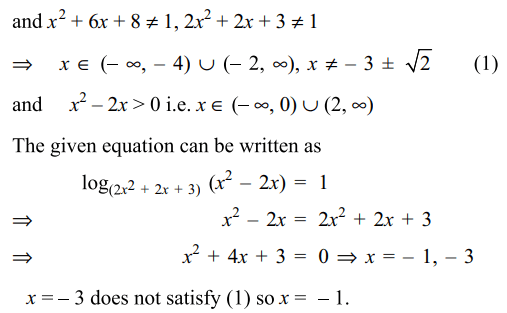
7. \[x^{\log_{5}x}>5\] implies
a) \[ x\epsilon \left(0, \infty\right)\]
b) \[ x\epsilon \left(0, 1/5\right) \cup \left(5,\infty\right)\]
c) \[ x\epsilon \left(1, \infty\right)\]
d) \[ x\epsilon \left(1, 2\right)\]
Explanation: Clearly x > 0, Taking logarithm with base 5,
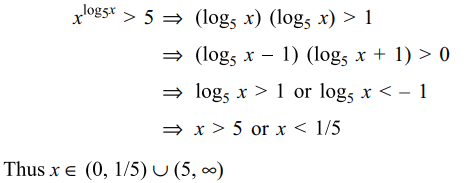
8. If \[\log x^{2} -\log 2x=3\log3-\log6\] then x equals
a) 9
b) 3
c) 4
d) 5
Explanation: Clearly x > 0

9. If \[\log_{0.5}\left(x-1\right)<\log_{0.25}\left(x-1\right)\] then x lies in the interval
a) \[\left(2,\infty\right)\]
b) \[\left(3,\infty\right)\]
c) \[\left(-\infty,0\right)\]
d) \[\left(0,3\right)\]
Explanation:

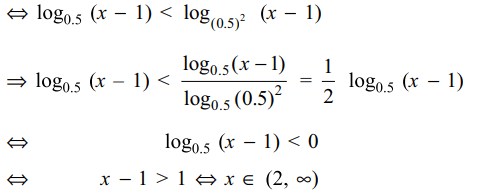
10. If \[N=n!\left(n \epsilon N,n>2\right)\] then \[\lim_{N \rightarrow\infty}\left[\left(\log_{2}N\right)^{-1}+\left(\log_{3}N\right)^{-1}+....+\left(\log_{n}N\right)^{-1}\right]\]
is
a) 2
b) 3
c) 4
d) 1
Explanation:
